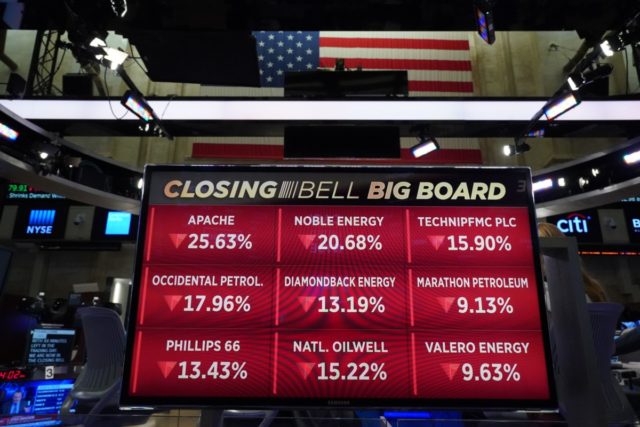U.S. stocks careened lower Wednesday after global health authorities recognized coronavirus as a pandemic and Trump administration plans for economic stimulus met with resistance on Capitol Hill.
The Dow Jones Industrial Average lost 1,465 points, or 5.86 percent. The S&P 500 declined 4.89 percent, and the Nasdaq Composite dropped 4.70 percent. The domestically focused small-cap Russell 2000 index fell by 6.66 percent.
That was enough to push stocks into “bear market” territory, defined as 20 percent below their recent high. It is the first time stocks have fallen that far below a recent high since the financial crisis. The coronavirus has brought the Dow’s 11-year bull market run to an end. Whether this is the beginning of a “bear market” will depend on if the decline is sustained.
Stocks have been on a while ride. On Monday, the major indexes suffered their worst losses since the global financial crisis in 2008–only to regain about half those losses on Tuesday after President Donald Trump announced an economic stimulus package. Stocks opened sharply lower on Wednesday and dropped further following the announcement by the World Health Organization that the coronavirus outbreak can be considered a global pandemic.
The Trump administration’s economic stimulus package has run into resistance on Capitol Hill. Democratic leaders, including House Speaker Nancy Pelosi and Senate Minority Leader Chuck Schumer, immediately announced their opposition to payroll tax cuts. On Wednesday, members of President Trump’s own party also signaled that they might not support the tax cut measure.
Senator Chuck Grassley, the Iowa Republican, reportedly said that immediate action on payroll tax holiday not needed–although he left open the possibility that it could be approved later. Grassley is the top Republican on the Senate Finance Committee.
“Let’s see a week, two weeks down the road if we get a feeling that we need to do something more dramatic,” Grassley said Wednesday.
Many investors worry that a delay of several weeks could mean any economic stimulus could come too late to keep the U.S. economy growing. Some economists think that we may already be in a recession.
“I wouldn’t be one bit surprised if when we look back at the data, it is decided … that the recession started in March,” Alan Blinder, a former Federal Reserve vice chairman, told CNBC’s “Squawk Alley.”

COMMENTS
Please let us know if you're having issues with commenting.